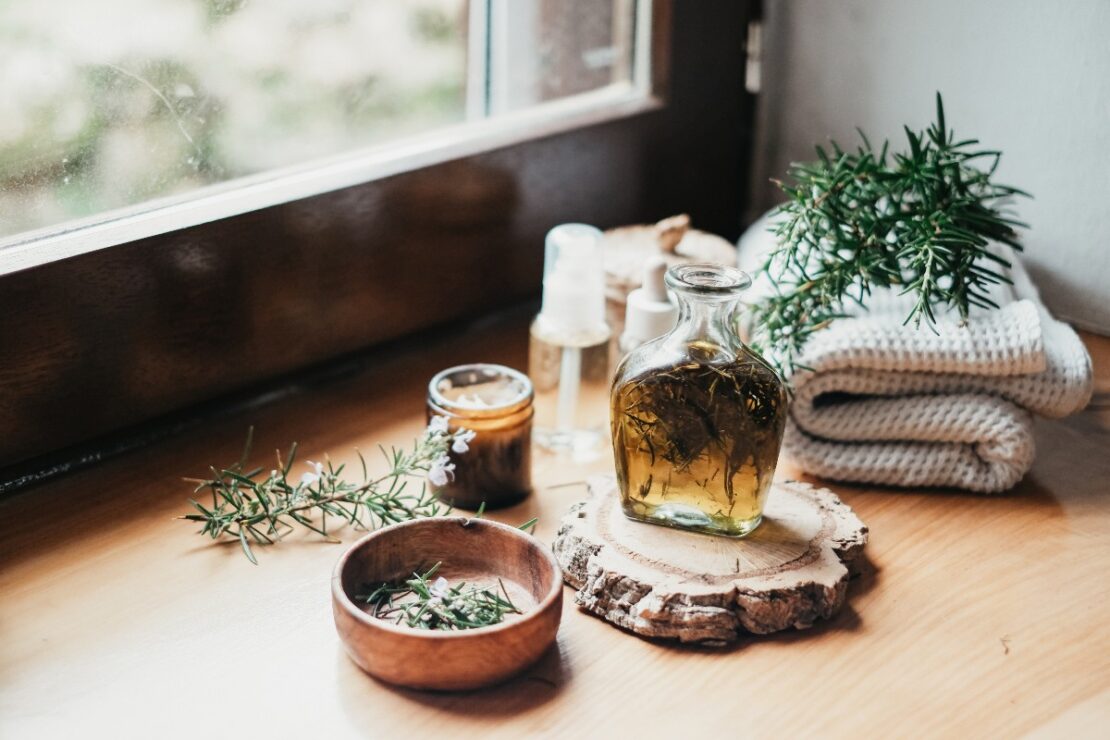
How to Prepare Herbal Oil for Hair Growth
If you experience hair loss or thinning hair, you are not alone. In fact, an estimated 50% of men and 25% of women will face noticeable hair thinning or loss by the age of 50 (D., 2024). For many, the first instinct is to reach for store-bought products, but these are often costly and full of harsh chemicals that can irritate the scalp and fail to address the underlying cause of the problem. Hair loss can be caused by a variety of factors, including genetics, hormonal changes, underlying medical conditions, stress, dietary deficiencies, and even certain medications that list it as a side effect (Harvard, 2024). Consulting a healthcare professional is important to identify the root cause and an effective approach to hair growth.
Hair loss is more than just a physical change—it often brings deep emotional and life challenges. Many people struggle with low self-esteem, feeling less confident as their appearance shifts. This can lead to anxiety, depression, or even social withdrawal, as they may feel self-conscious in public or during intimate moments. For some, the financial strain of seeking treatment options adds another layer of stress.
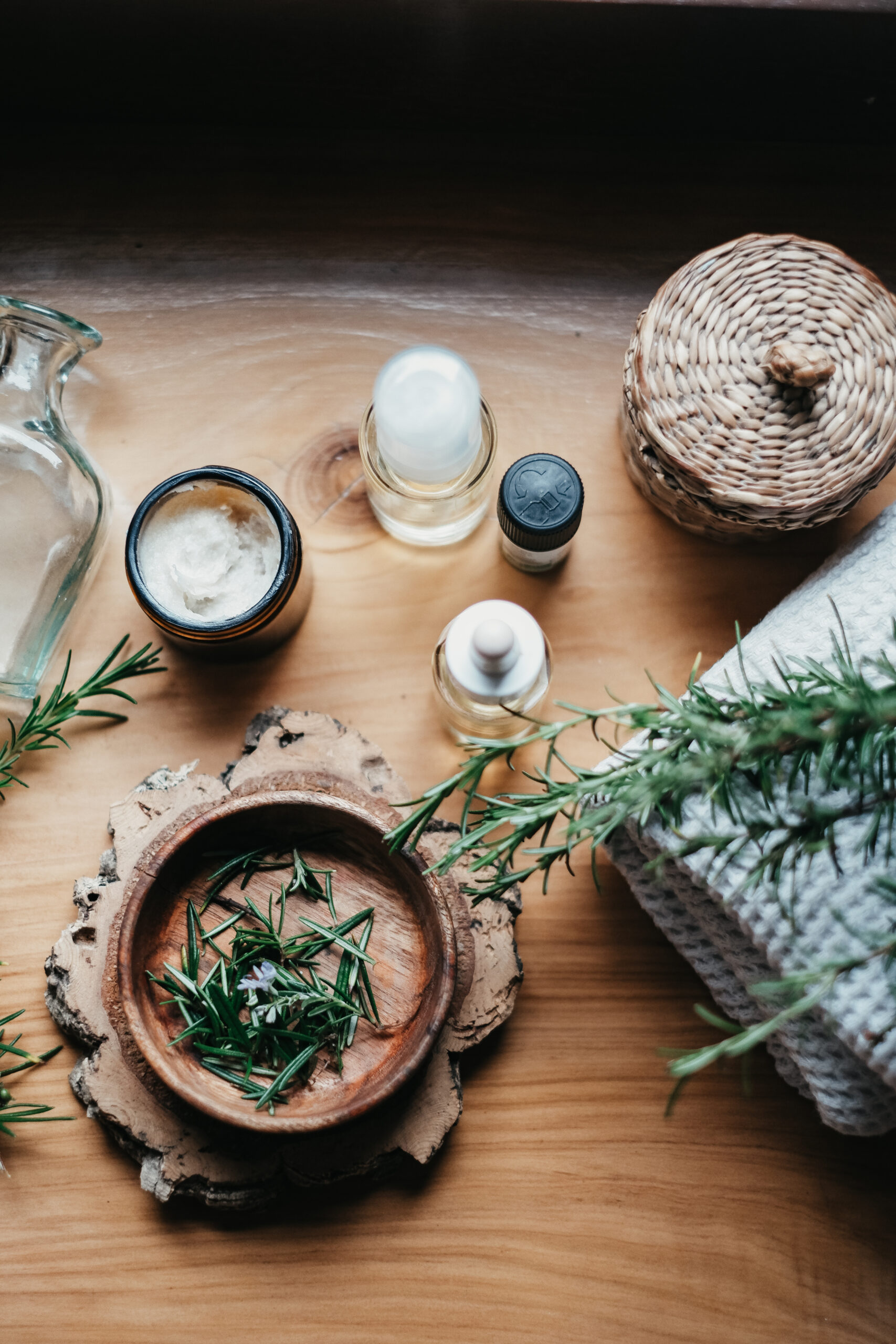
Hair Health Support Through Herbs
The good news? Nature offers gentle, nourishing support through beneficial plants. Herbs like rosemary (Salvia rosmarinus), peppermint (Mentha x piperita), and lavender (Lavandula spp.) are rich in compounds that nourish the scalp and stimulate hair follicles, supporting healthy hair growth. Herbs are not only affordable but also provide a gentle, supportive solution that complements efforts to address the root causes of hair loss. Plus, these herbs are broadly beneficial for almost everyone—not just those dealing with hair loss—as they promote overall hair health while encouraging hair growth.
In this article, you’ll discover the most popular herbs commonly used to promote hair health and learn how to create your own herbal oil for hair growth with a simple DIY recipe that can elevate and empower your self-care routine. Explore how to nourish your hair naturally while tapping into time-honored traditions that have helped countless people restore both their hair and confidence over the ages.
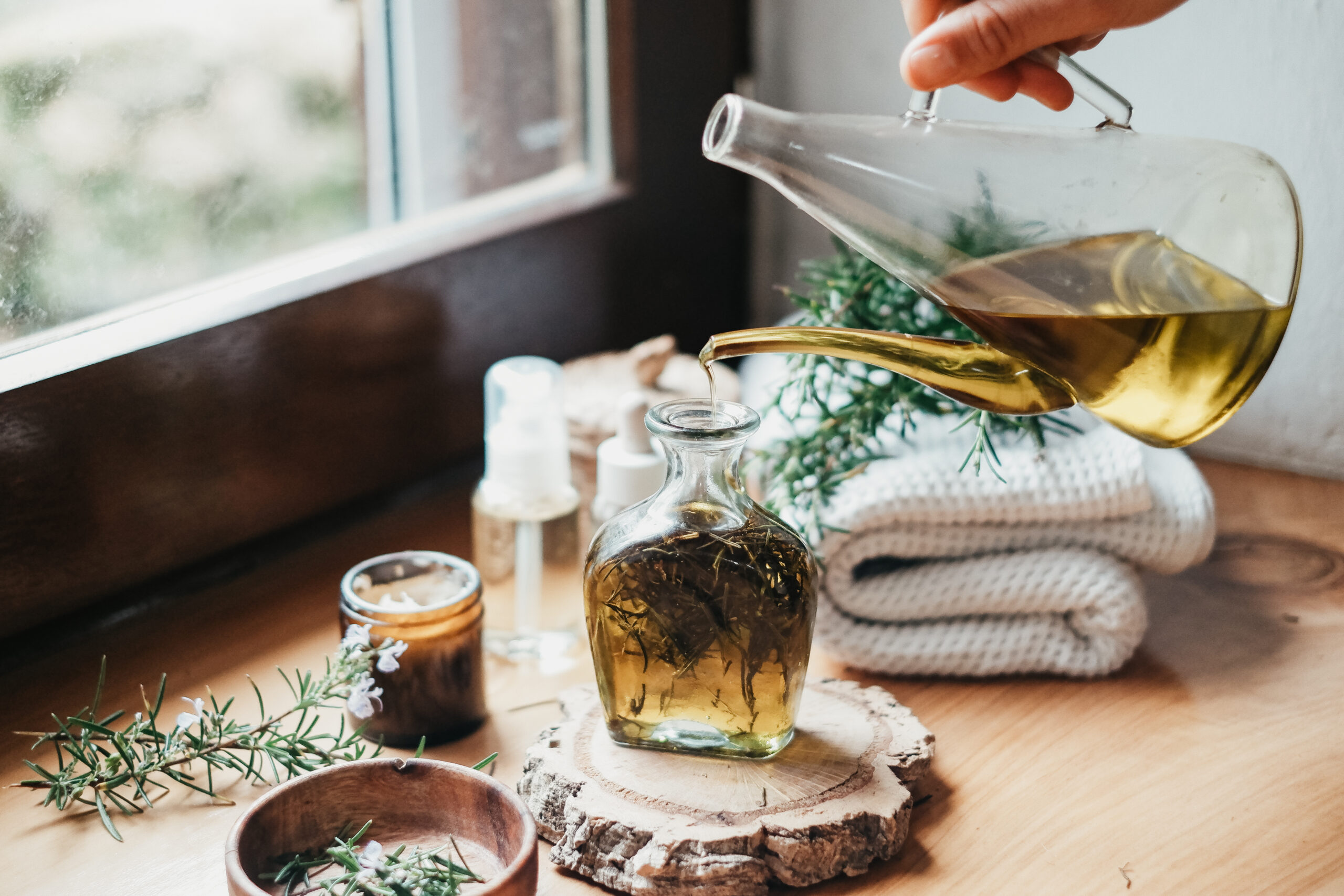
The History of Hair Oiling
Hair oiling is an ancient tradition practiced in India and many cultures worldwide, where oils are applied to the scalp and hair to promote healthy hair growth. This ritual is believed to stave off hair loss, add shine and volume, and even slow the graying process (Mysore & Arghya, 2022). A variety of carrier or base oils are commonly used, with popular choices including olive oil, coconut oil, almond oil, and argan oil.
The type of oil you choose is entirely up to you, as each oil offers its own unique benefits for hair health. For instance, coconut oil is known for its deep moisturizing properties, as well as its antibacterial and antifungal qualities that help maintain a healthy scalp. Olive oil, on the other hand, is rich in antioxidants, which can help strengthen and nourish hair, while argan oil is praised for balancing sebum production (Mysore & Arghya, 2022). Each oil can be tailored to an individual’s specific hair care needs.
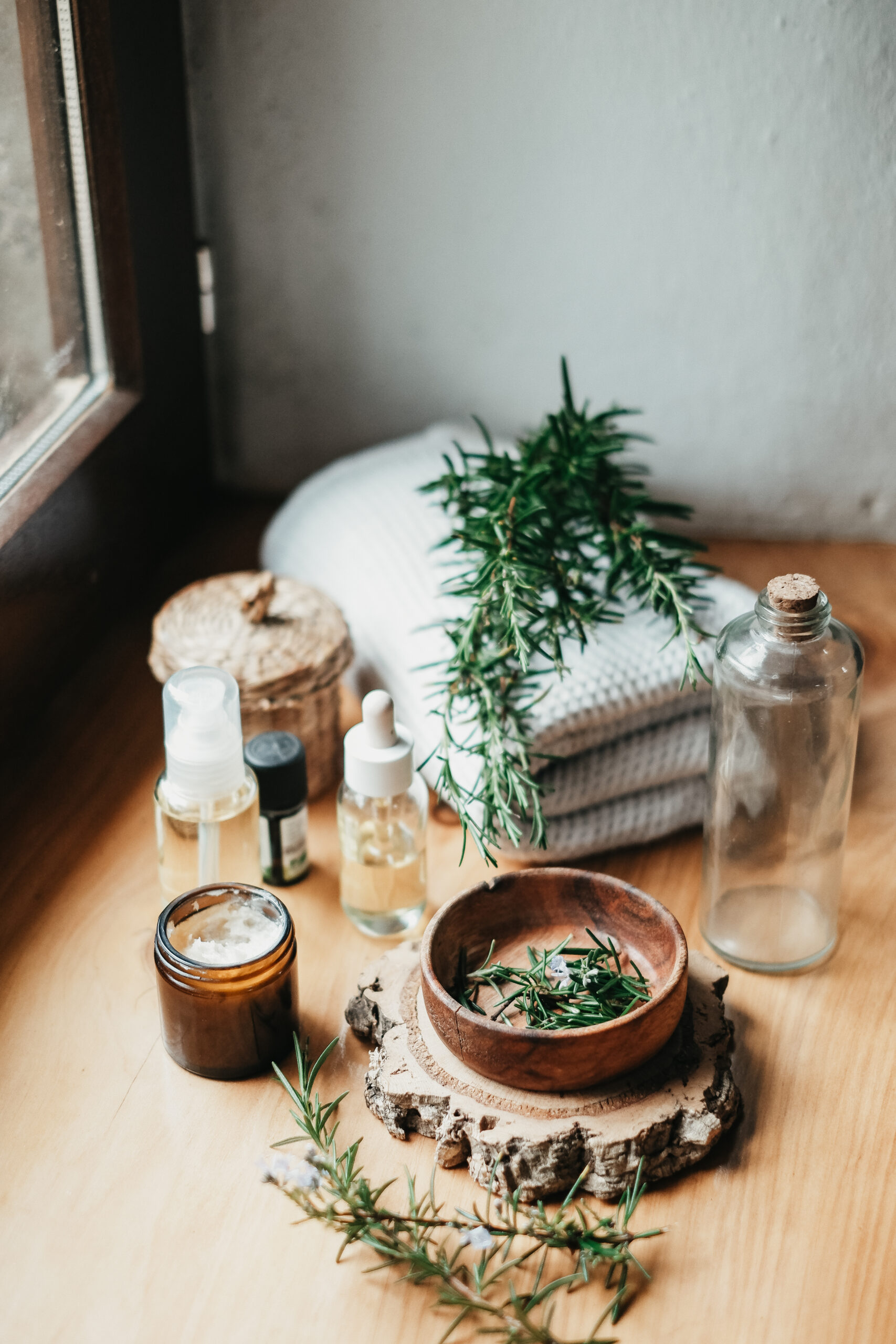
Herbs Traditionally Used Topically for Hair Growth
Rosemary (Salvia rosmarinus)
Rosemary has a long tradition of use for supporting hair health. This herb is a common ingredient found in shampoos and conditioners because it is thought to help stimulate circulation for the hair and scalp, which in turn can help promote hair growth. Rosemary is also believed to help forestall hair loss, reduce oil build-up, and stop gray hair from spreading (Miller & Miller, 1995).
A scientific study published in 2015 found that rosemary essential oil was just as effective at encouraging hair growth as minoxidil, a topical medication for hair growth found in Rogaine (Panahi et al., 2015). The study looked at individuals with hair loss due to a genetic predisposition called androgenetic alopecia (AGA). Panahi et al. (2015) also discovered that study participants who used solely rosemary experienced less scalp itching compared to the minoxidil group, an added benefit.
Peppermint (Mentha x piperita)
Peppermint has refreshing and invigorating qualities that are thought to help stimulate hair growth and support hair health. One scientific study found that a 3% solution of peppermint essential oil diluted with jojoba oil was more effective at supporting hair growth in mice compared to minoxidil; the study noted that these results suggest peppermint essential oil supports the anagen stage, the active phase of hair growth, and could be used as a “practical agent for hair growth” (Oh et al., 2014). Unfortunately, there have been no studies in humans to support this yet, but these initial findings are promising and call for further research.
Lavender (Lavandula spp.)
This lovely floral is not only known to help soothe stress and tension, but it is also indicated for topical use to address skin struggles like dermatitis, dry skin, acne, hair loss, and dandruff (Miller & Miller, 1995). Herbalist Brigitte Mars writes that lavender is commonly used in shampoos and hair rinses to address hair loss, noting its antiseptic and stimulating qualities (Mars, 2007). A scientific study published in 2016 revealed that two different solutions of lavender essential oil mixed with jojoba oil—both a 3% and 5% dilution ratio—had significant positive effects on hair growth in mice; the study stated that lavender essential oil “could be practically applied as a hair growth-promoting agent” (Lee et al., 2016). Two human clinical studies using a blend of lavender and other essential oils (thyme, lavender, rosemary, and cedarwood) in a carrier oil for alopecia areata showed some promising results for hair regrowth (Ezekwe et al., 2020).
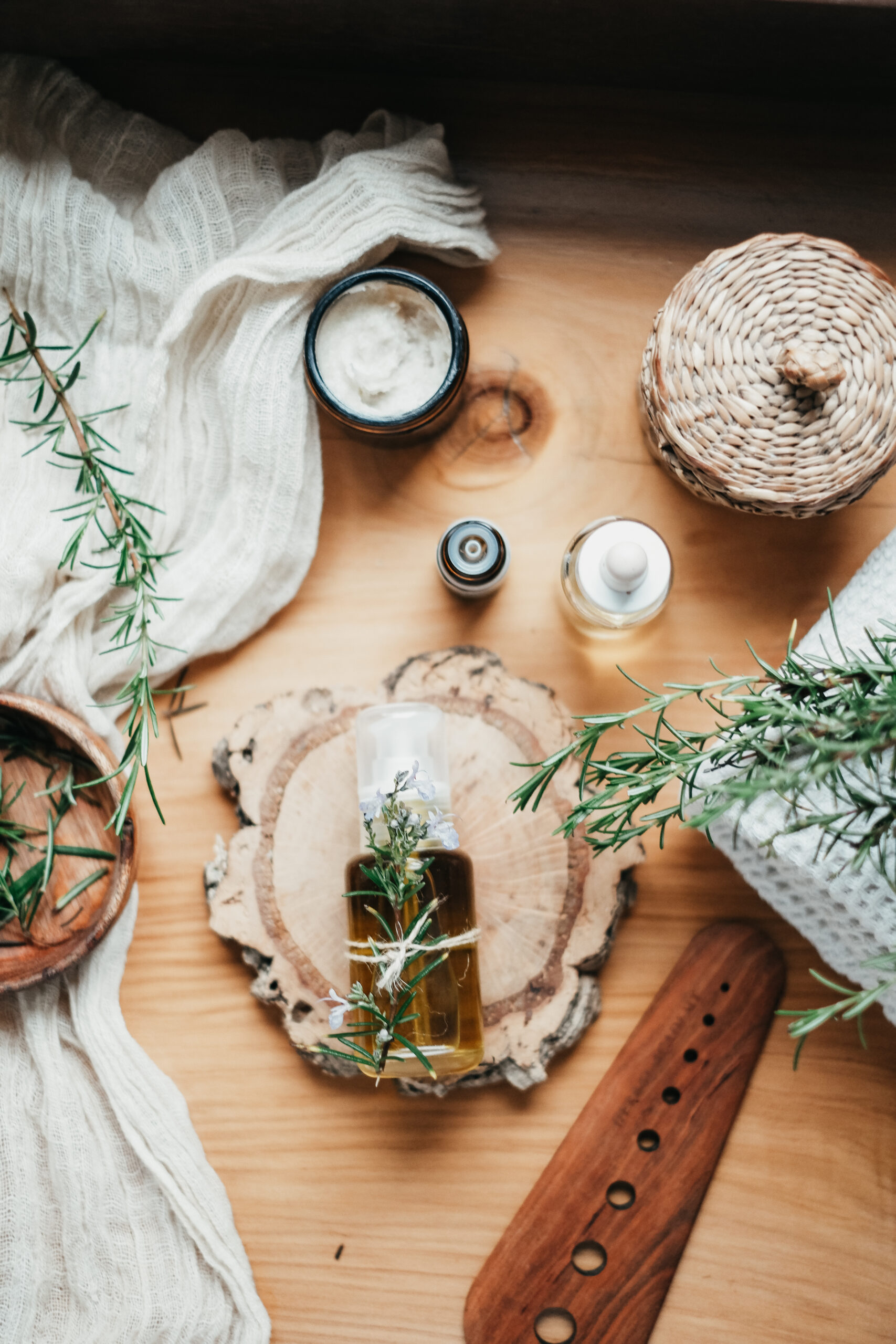
How to Make Herbal-Infused Hair Growth Oil
DIY Herbal Hair Growth Oil Recipe
This herbal hair oil recipe infuses the nourishing and supportive health benefits of rosemary into sweet almond oil, then adds a final touch of rosemary, lavender, and peppermint essential oils for an extra aromatic and beneficial boost.
10 fluid ounces sweet almond oil (or another carrier oil of your choice) To Use:
Massage several dropperfuls of the hair oil into your scalp for several minutes. Allow the oil to sit on your scalp and hair for at least 30 minutes, or even overnight. When you’re ready to remove it, rinse it out in the shower using water and your regular shampoo.
1 cup dried rosemary (Rosmarinus officinalis) leaf
60 drops rosemary (Rosmarinus officinalis) essential oil
30 drops lavender (Lavandula spp.) essential oil
10 drops peppermint (Mentha x piperita) essential oil
**Safety Considerations: Note that essential oils should always be diluted before topical use. Avoid applying undiluted essential oil directly to the skin to reduce the risk of skin irritation and sensitization. Do not use this recipe for children under the age of 12. If you are pregnant, nursing, or have a compromised immune system, cut the essential oil content in half to make this recipe at a 1% dilution ratio. This recipe does not exceed a 2% dilution ratio for safety reasons.
In Closing,
While hair loss can feel like a challenging journey, the botanical kingdom offers a gentle yet powerful support system. By incorporating herbal oils like rosemary, peppermint, and lavender into your self-care routine, you’re tapping into ancient tradition and wisdom that has supported healthy hair for centuries. Whether you want to address thinning hair or nurture your hair growth, this natural DIY approach invites you to nourish your physical and mental health, while embracing the beauty of the natural world.
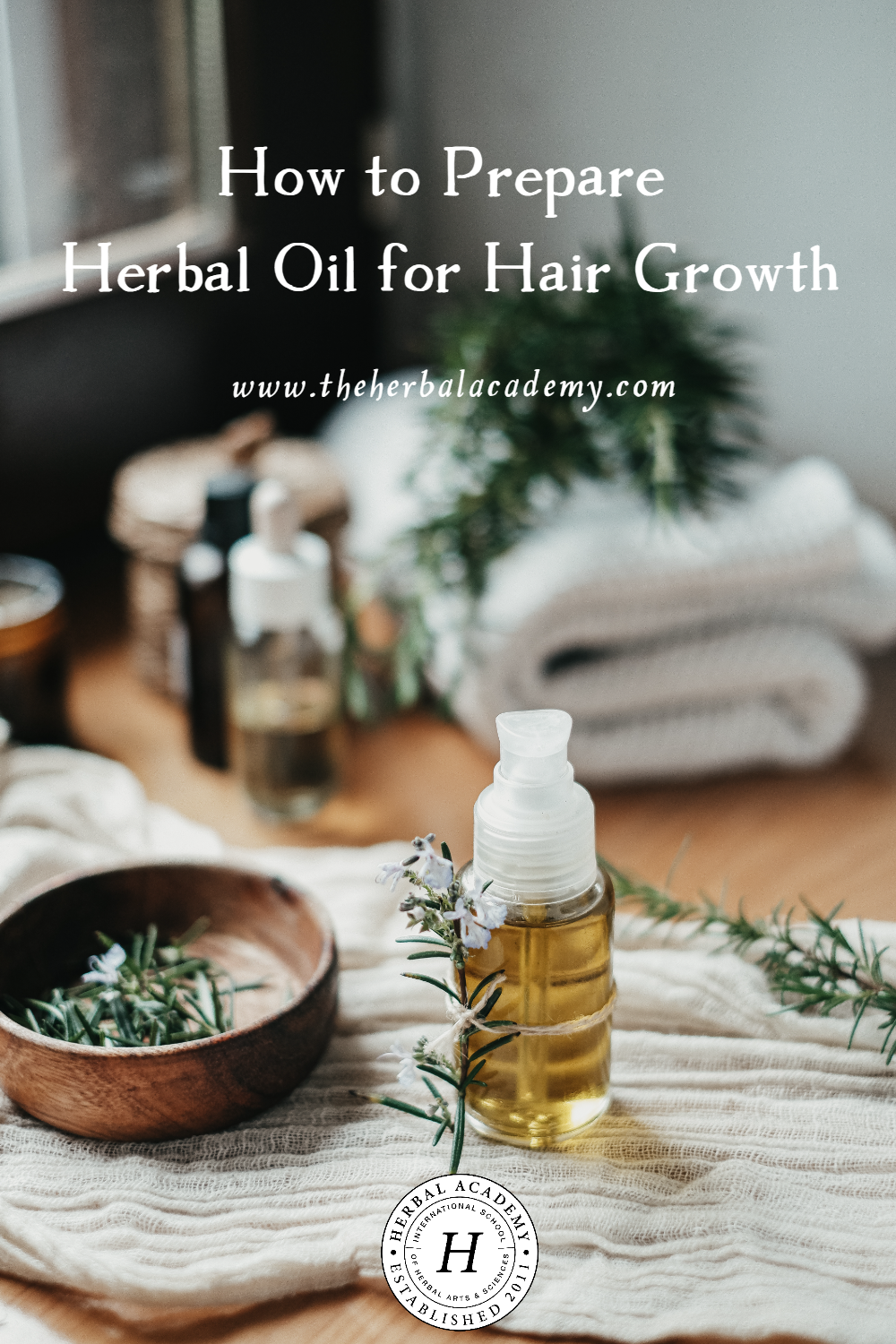
REFERENCES
Ezekwe, N., King, M., Hollinger, J.C. (2020). The use of natural ingredients in the treatment of alopecias with an emphasis on central centrifugal cicatricial alopecia: A systematic review. Journal of Clinical and Aesthetic Dermatology, 13(8), 23-27. PMID: https://pubmed.ncbi.nlm.nih.gov/33178378/
Harvard Health Publishing: Harvard Medical School. (2024). Hair loss. https://www.health.harvard.edu/a_to_z/hair-loss-a-to-z
Lee, B.H., Lee, J.S., & Kim, Y.C. (2016). Hair growth-promoting effects of lavender oil in C57BL/6 mice. Toxicology Research, 32(2),103-8. https://doi.org/10.5487/TR.2016.32.2.103
Mars, B. (2007). The desktop guide to herbal medicine. Basic Health Publications.
Miller, L., & Miller, B. (1995). Ayurveda & aromatherapy: The earth essential guide to ancient wisdom and modern healing. Lotus Press.
Mysore, V., & Arghya, A. (2022). Hair oils: Indigenous knowledge revisited. International Journal of Trichology, 14(3), 84-90. https://doi.org/10.4103/ijt.ijt_189_20
Oh, J.Y., Park, M.A., & Kim, Y.C. (2014). Peppermint oil promotes hair growth without toxic signs. Toxicology Research, 30(4), 4297-304. https://doi.org/10.5487/TR.2014.30.4.297
Panahi, Y., Taghizadeh, M., Marzony, E.T., & Sahebkar, A. (2015). Rosemary oil vs minoxidil 2% for the treatment of androgenetic alopecia: A randomized comparative trial. Skinmed, 13(1), 15-21. https://pubmed.ncbi.nlm.nih.gov/25842469/








